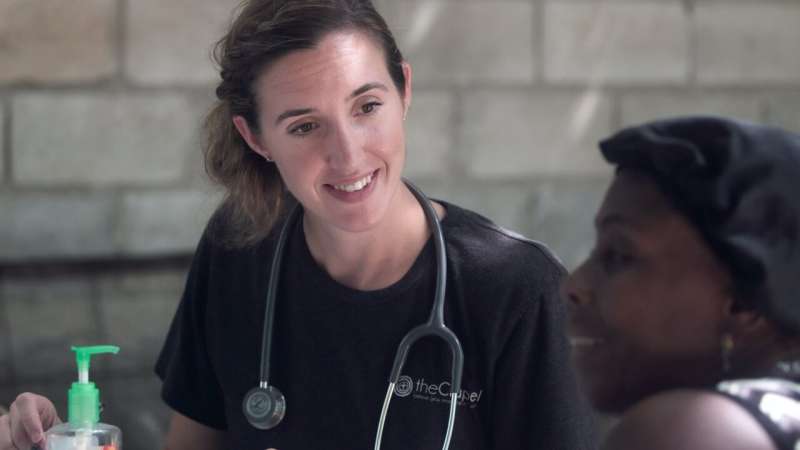This article has been reviewed according to Science X's editorial process and policies. Editors have highlighted the following attributes while ensuring the content's credibility:
fact-checked
reputable news agency
proofread
Q&A: Fertility considerations in cancer treatment, preserving hope for the future

Question: I'm a 28-year-old woman recently diagnosed with breast cancer. My care team recommends starting treatment as soon as possible. While I'm ready to do the necessary treatments, I'm worried about the affect it may have on my ability to have children in the future. Are there options that can help preserve my fertility during cancer treatment?
Answer: When a person is diagnosed with cancer, the focus is often on immediate treatment and recovery. However, it's important to consider the long-term effects of cancer and its therapies on fertility. These treatments can significantly affect a person's reproductive organs, potentially altering their ability to have children in the future.
Cancer and its treatments can cause changes in your body. For some people, cancer damages a part of the reproductive process and affects fertility. For others, the necessary cancer treatments interfere with fertility. The likelihood that cancer treatment will harm your fertility depends on the type and stage of cancer, the cancer treatment method and your age at the time of treatment.
Cancers that have a greater risk of affecting fertility—including through treatment—are breast cancer, uterine cancer, cervical cancer, ovarian cancer, colon cancer, prostate cancer, testicular cancer, thyroid cancer and blood cancers like lymphomas.
Certain cancer treatments can harm your fertility. The effects might be temporary or permanent.
Cancer treatment and its effects might include:
- Chemotherapy: This common cancer treatment targets and destroys active cells in the body. The ovaries and testicles, which are vital reproductive organs, contain a high number of active cells and are susceptible to damage from chemotherapy. This damage can affect the ability of the ovaries or testicles to produce viable eggs or sperm after cancer treatment, thus affecting fertility. Future fertility depends on various factors, such as the type, duration and dose of chemotherapy, and the patient's age.
- Radiation: This therapy also can affect fertility, primarily when administered in the pelvic area at high doses. In some cases, patients may opt to have surgery to reposition the ovaries from the radiation field, reducing the risk of damage.
- Surgery: Fertility also can be harmed by the surgical removal of the testicles, uterus or ovaries.
- Other cancer medications: Hormone therapies used to treat certain cancers, including breast cancer, can affect fertility. But the effects often are reversible. Once treatment stops, fertility may be restored.
Various fertility preservation options may be available for cancer patients before they undergo cancer treatment.
- Freezing: For women, egg freezing or embryo freezing are standard practices, with minor differences depending on whether the patient has a partner or intends to use donor sperm. These methods involve hormonal stimulation with injections over a few weeks and retrieval of eggs from the ovaries. The eggs can be immediately cryopreserved or mixed with sperm for fertilization for the cryopreservation of embryos.
- Cryopreservation: Another option is ovarian tissue cryopreservation, which involves removing and freezing part or all of an ovary. The ovarian tissue is divided into small strips and cryopreserved for future use. This method is particularly suitable for young girls who haven't reached puberty or women who need to start cancer treatment immediately. Men may consider sperm cryopreservation, which involves freezing and storing sperm for use at a later date. Testicular tissue cryopreservation also could be a consideration for boys before puberty.
- Suppression: Ovarian suppression may be considered, but it is not a proven method of fertility preservation. Ovarian suppression involves medications temporarily suppressing ovarian activity, potentially protecting the ovaries from chemotherapy's effects.
During cancer treatment, radiation shields can protect fertility in men and women. This procedure places small lead shields over the ovaries or testicles to reduce the radiation exposure they receive. Proton radiotherapy also can preserve fertility by delivering targeted therapy and minimizing exposure to adjoining organs and tissues.
The diagnosis of cancer and the treatment process can be overwhelming. However, you have options if you're concerned about how cancer treatment might affect your fertility. Don't wait. Talk with your care team about fertility preservation methods before you begin cancer treatment to help you make an informed choice.
2023 Mayo Clinic News Network. Distributed by Tribune Content Agency, LLC.



















